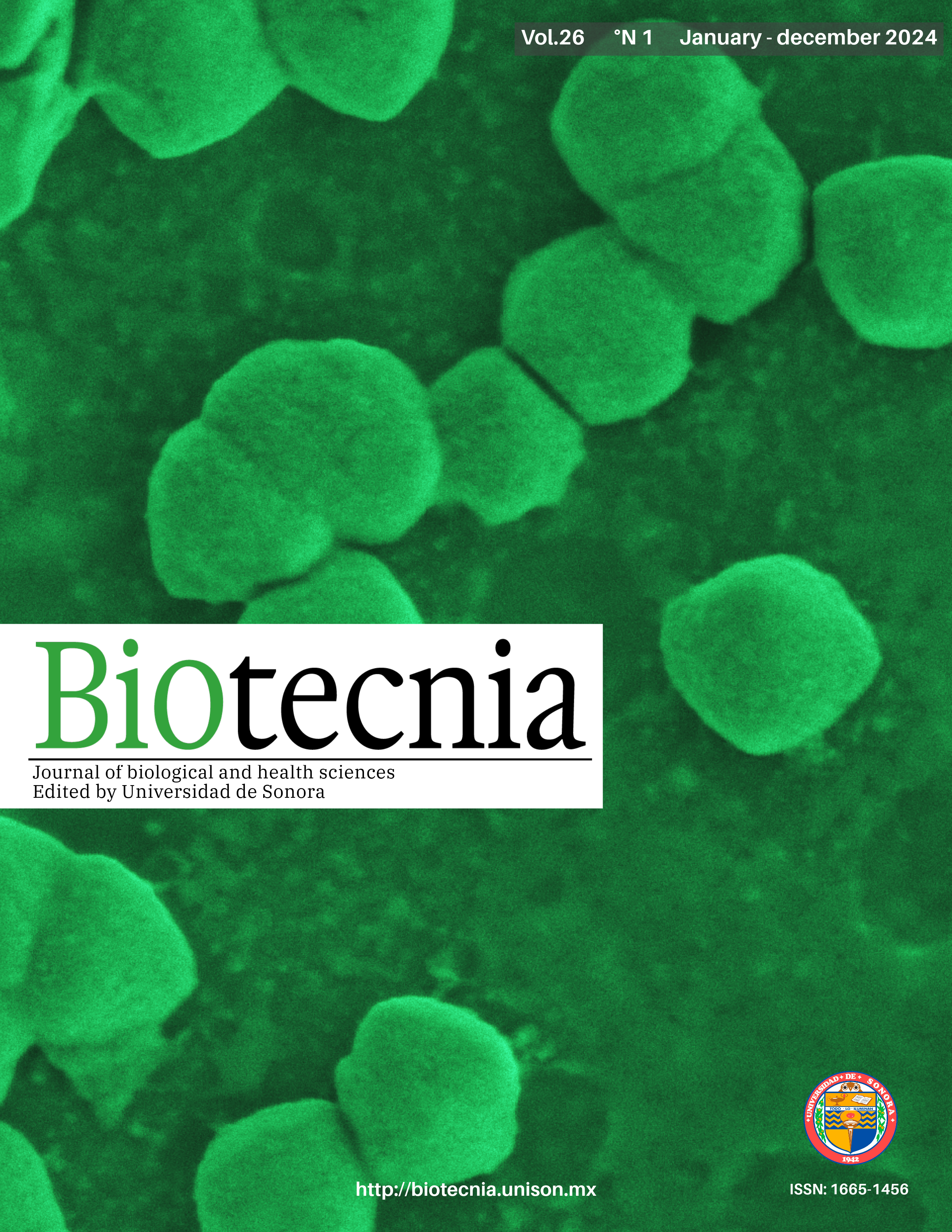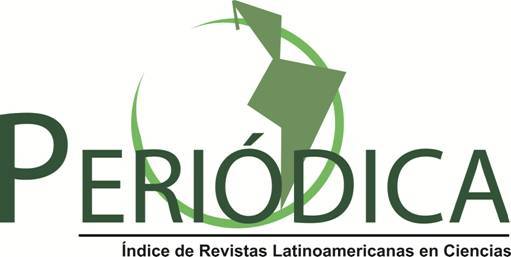Potential of Verrucodesmus verrucosus in the removal of nitrogen and phosphorus structures from wastewater from pig farms
DOI:
https://doi.org/10.18633/biotecnia.v26.2197Keywords:
biomass, maximum removal, mixotrophic, wastewaterAbstract
Verrucodesmus verrucosus in residual water from a pig farm located in Suchiapa, Chiapas, Mexico, was evaluated as a mixotrophic culture medium. The evaluation was carried out for 40 days, under the 12:12 light / dark cycle, two growth stages were evaluated (piglet and fattening) and the 50:50 mixture of these, as well as to the residual water two pre-treatments were applied, this consisted of a filtration process using a 15 µm diameter nylon filter and a sterilization process. The microalgal species Verrucodesmus verrucosus was shown to have bioremediation potential by growing in wastewater and producing biomass, demonstrating high efficiency in removing contaminants. The maximum Chemical Oxygen Demand (COD) removal was in the Ps treatment (sterile piglet) where the removal of 96.8 % was reached, while the Biochemical Oxygen Demand (BOD) had a maximum removal of 96.7 % in the Pf treatment (filtered piglet). The removal of total nitrogen, ammonia and nitrate was demonstrated with a percentage of 85.5 %, 74 % and 91 % respectively. As for the maximum removal of phosphorus and phosphate, they reach values of 97.9 % and 82 % respectively. On the other hand, it was possible to demonstrate the antagonistic capacity of this microalga with respect to Escherichia coli, where 100 % elimination was achieved.
Downloads
References
Azam, R., Kothari, R., Singh, H. M., Ahmad, S., Ashokkumar, V., & Tyagi, V. V. (2020). Production of algal biomass for its biochemical profile using slaughterhouse wastewater for treatment under axenic conditions. Bioresource technology, 306, 123116. doi: https://doi.org/10.1016/j.biortech.2020.123116
Bibbal, D., Um, M. M., Diallo, A. A., Kérourédan, M., Dupouy, V., Toutain, P. L., ... & Brugère, H. (2018). Mixing of Shiga toxin-producing and enteropathogenic Escherichia coli in a wastewater treat-ment plant receiving city and slaughterhouse wastewater. International Journal of Hygiene and Envi-ronmental Health, 221(2), 355-363. doi: https://doi.org/10.1016/j.ijheh.2017.12.009
Banach, J. L., van Overbeek, L. S., Groot, M. N., Van der Zouwen, P. S., & Van der Fels-Klerx, H. J. (2018). Efficacy of chlorine dioxide on Escherichia coli inactivation during pilot-scale fresh-cut lettuce processing. International journal of food microbiology, 269, 128-136. doi: https://doi.org/10.1016/j.ijfoodmicro.2018.01.013
Cai, X. B., Yu, Q. Q., Liu, R., Zhao, Y., & Chen, L. J. (2017). Cultivation of Spirulina platensis in Digest-ed Piggery Wastewater Pretreated by SBR with Operating Conditions Optimization. Huan Jing ke Xue= Huanjing Kexue, 38(7), 2910-2916. doi: https://doi.org/10.13227/j.hjkx.201612168
Chen, C. Y., Kuo, E. W., Nagarajan, D., Ho, S. H., Dong, C. D., Lee, D. J., & Chang, J. S. (2020). Culti-vating Chlorella sorokiniana AK-1 with swine wastewater for simultaneous wastewater treatment and algal biomass production. Bioresource technology, 302, 122814. doi: https://doi.org/10.1016/j.biortech.2020.122814
Chen, J., Yang, Y., Liu, Y., Tang, M., Wang, R., Hu, H., ... & Zhang, X. (2020). Effects caused by chlor-tetracycline and oxytetracycline in anaerobic digestion treatment of real piggery wastewater: treatment efficiency and bacterial diversity. International Journal of Hydrogen Energy, 45(15), 9222-9230. doi: https://doi.org/10.1016/j.ijhydene.2020.01.138
Cheng, D. L., Ngo, H. H., Guo, W. S., Chang, S. W., Nguyen, D. D., & Kumar, S. M. (2019). Microalgae biomass from swine wastewater and its conversion to bioenergy. Bioresource technology, 275, 109-122. doi: https://doi.org/10.1016/j.biortech.2018.12.019
Cheng, H. H., Narindri, B., Chu, H., & Whang, L. M. (2020). Recent advancement on biological technolo-gies and strategies for resource recovery from swine wastewater. Bioresource technology, 303, 122861. doi: https://doi.org/10.1016/j.biortech.2020.122861
Chen, Z., Shao, S., He, Y., Luo, Q., Zheng, M., Zheng, M., ... & Wang, M. (2020). Nutrients removal from piggery wastewater coupled to lipid production by a newly isolated self-flocculating microalga Des-modesmus sp. PW1. Bioresource technology, 302, 122806. doi: https://doi.org/10.1016/j.biortech.2020.122806
Feng, C., Welles, L., Zhang, X., Pronk, M., de Graaff, D., & van Loosdrecht, M. (2020). Stress-induced assays for polyphosphate quantification by uncoupling acetic acid uptake and anaerobic phosphorus release. Water research, 169, 115228. doi: https://doi.org/10.1016/j.watres.2019.115228
García, D., Posadas, E., Blanco, S., Acién, G., García-Encina, P., Bolado, S., & Muñoz, R. (2018). Evalua-tion of the dynamics of microalgae population structure and process performance during piggery wastewater treatment in algal-bacterial photobioreactors. Bioresource Technology, 248, 120-126. doi: https://doi.org/10.1016/j.biortech.2017.06.079
Hegewald, E., Bock, C., & Krienitz, L. (2013). A phylogenetic study on Scenedesmaceae with the descrip-tion of a new species of Pectinodesmus and the new genera Verrucodesmus and Chodatodesmus (Chlorophyta, Chlorophyceae). Fottea, 13(2), 149-164.
Jin, Y., Lin, Y., Wang, P., Jin, R., Gao, M., Wang, Q., ... & Ma, H. (2019). Volatile fatty acids production from saccharification residue from food waste ethanol fermentation: effect of pH and microbial com-munity. Bioresource technology, 292, 121957. doi: https://doi.org/10.1016/j.biortech.2019.121957
Kiel LW, Huaypo L, San Nicolas L, Lake Y, Bali LBL, Dngskär T, Omapera L, GenBank number.
Li, X., Yang, W. L., He, H., Wu, S., Zhou, Q., Yang, C., ... & Lou, W. (2018). Responses of microalgae Coelastrella sp. to stress of cupric ions in treatment of anaerobically digested swine wastewater. Bioresource technology, 251, 274-279. doi: https://doi.org/10.1016/j.biortech.2017.12.058
López-Mendoza Z, Tavera R, Novelo E (2015) El fitoplancton de un canal de Xochimilco y la importancia de estudiar ecosistemas acuáticos urbanos. TIP Revista especializada en ciencias quimico-biológicas 18(1): 13-28.
Lu, W., Alam, M. A., Liu, S., Xu, J., & Saldivar, R. P. (2020). Critical processes and variables in microal-gae biomass production coupled with bioremediation of nutrients and CO2 from livestock farms: A re-view. Science of the Total Environment, 716, 135247. doi: https://doi.org/10.1016/j.scitotenv.2019.135247
Li, X., Liu, C., Chen, Y., Huang, H., & Ren, T. (2018). Antibiotic residues in liquid manure from swine feedlot and their effects on nearby groundwater in regions of North China. Environmental Science and Pollution Research, 25, 11565-11575. doi: https://doi.org/10.1007/s11356-018-1339-1
Likiliki, C., Convers, B., & Béline, F. (2020). Dataset on the characteristics of the liquid effluent issued from separation of faeces and urine under slats using V-shaped scraper in swine buildings. Data in Brief, 30, 105533. doi: https://doi.org/10.1016/j.dib.2020.105533
Nagarajan, D., Kusmayadi, A., Yen, H. W., Dong, C. D., Lee, D. J., & Chang, J. S. (2019). Current ad-vances in biological swine wastewater treatment using microalgae-based processes. Bioresource tech-nology, 289, 121718. doi: https://doi.org/10.1016/j.biortech.2019.121718
NMX-AA-034-SCFI-2015. Water analisys – measurement of salts and solids dissolved in natural water, wastewaters and treated wastewaters - Test method
NMX-AA-008-SCFI-2011. Water Analysis - pH Determination - Test Method - (Cancels NMX-AA-008- SCFI-2000).
NMX-AA-030/1-SCFI-2012. Water analysis - Determination of the chemical oxygen demand, in natural waters, wastewaters and treated wastewaters - test method - part 1 – Opened reflux method.
NMX-AA-028-SCFI-2000. Water analisys - Determination of the biochemical oxygen demand in natural, wastewaters (bod5) and wastewaters treated - Test method.
NMX-AA-42-1987. Water quality determination of the most likely number (MPN) of total coliforms, fecal coliforms (thermotolerants) and presumptive Escherichia coli.
Pei, H., Yang, Z., Nie, C., Hou, Q., Zhang, L., Wang, Y., & Zhang, S. (2018). Using a tubular photosyn-thetic microbial fuel cell to treat anaerobically digested effluent from kitchen waste: Mechanisms of or-ganics and ammonium removal. Bioresource technology, 256, 11-16. doi: https://doi.org/10.1016/j.biortech.2018.01.144
Rasoul-Amini, S., Montazeri-Najafabady, N., Shaker, S., Safari, A., Kazemi, A., Mousavi, P., ... & Ghasemi, Y. (2014). Removal of nitrogen and phosphorus from wastewater using microalgae free cells in bath culture system. Biocatalysis and Agricultural Biotechnology, 3(2), 126-131. doi: https://doi.org/10.1016/j.bcab.2013.09.003
Sánchez-Roque, Y., Luna, Y. P., Acosta, J. M., Vázquez, N. F., Sebastian, J. P., & Hernández, R. B. (2020). Optimization for the production of verrucodesmus verrucosus biomass through crops in auto-trophic and mixotrophic conditions with potential for the production of biodiesel. Revista Mexicana de Ingeniería Química, 19(1), 133-147. doi: https://doi.org/10.24275/rmiq/Bio463
Sánchez-Zurano, A., Gomez-Serrano, C., Acién-Fernández, F. G., Fernández-Sevilla, J. M., & Molina-Grima, E. (2020). A novel photo-respirometry method to characterize consortia in microal-gae-related wastewater treatment processes. Algal Research, 47, 101858. doi: https://doi.org/10.1016/j.algal.2020.101858
Savin, M., Bierbaum, G., Hammerl, J. A., Heinemann, C., Parcina, M., Sib, E., ... & Kreyenschmidt, J. (2020). Antibiotic-resistant bacteria and antimicrobial residues in wastewater and process water from German pig slaughterhouses and their receiving municipal wastewater treatment plants. Science of The Total Environment, 727, 138788. doi: https://doi.org/10.1016/j.scitotenv.2020.138788
Stafilov, T., Špirić, Z., Glad, M., Barandovski, L., Bačeva Andonovska, K., Šajn, R., & Antonić, O. (2020). Study of nitrogen pollution in the Republic of North Macedonia by moss biomonitoring and Kjeldahl method. Journal of Environmental Science and Health, Part A, 55(6), 759-764. doi: https://doi.org/10.1080/10934529.2020.1738825
Sudiarto, S. I. A., Renggaman, A., & Choi, H. L. (2019). Floating aquatic plants for total nitrogen and phosphorus removal from treated swine wastewater and their biomass characteristics. Journal of envi-ronmental management, 231, 763-769. doi: https://doi.org/10.1016/j.jenvman.2018.10.070
Wang, M., Yang, Y., Chen, Z., Chen, Y., Wen, Y., & Chen, B. (2016). Removal of nutrients from undi-luted anaerobically treated piggery wastewater by improved microalgae. Bioresource Technology, 222, 130-138. doi: https://doi.org/10.1016/j.biortech.2016.09.128
Wang, M., Kuo-Dahab, W. C., Dolan, S., & Park, C. (2014). Kinetics of nutrient removal and expression of extracellular polymeric substances of the microalgae, Chlorella sp. and Micractinium sp., in wastewater treatment. Bioresource technology, 154, 131-137. doi: https://doi.org/10.1016/j.biortech.2013.12.047
Jin, W. A. N. G., Ye, H. A. N., ZHAO, J. Z., ZHOU, Z. J., & Huan, F. A. N. (2017). Consuming fer-mented distillers' dried grains with solubles (DDGS) feed reveals a shift in the faecal microbiota of growing and fattening pigs using 454 pyrosequencing. Journal of integrative agriculture, 16(4), 900-910. doi: https://doi.org/10.1016/S2095-3119(16)61523-X
Wilfert, P., Dugulan, A. I., Goubitz, K., Korving, L., Witkamp, G. J., & Van Loosdrecht, M. C. M. (2018). Vivianite as the main phosphate mineral in digested sewage sludge and its role for phosphate recovery. Water research, 144, 312-321. doi: https://doi.org/10.1016/j.watres.2018.07.020
Wen, Y., He, Y., Ji, X., Li, S., Chen, L., Zhou, Y., ... & Chen, B. (2017). Isolation of an indigenous Chlo-rella vulgaris from swine wastewater and characterization of its nutrient removal ability in undiluted sewage. Bioresource technology, 243, 247-253. doi: https://doi.org/10.1016/j.biortech.2017.06.094
Wu, W., Cheng, L. C., & Chang, J. S. (2020). Environmental life cycle comparisons of pig farming inte-grated with anaerobic digestion and algae-based wastewater treatment. Journal of environmental man-agement, 264, 110512. doi: https://doi.org/10.1016/j.jenvman.2020.110512
Yang, Y., Xing, S., Li, S., Niu, Y., Li, C., Huang, T., & Liao, X. (2020). Potential regulation of small RNAs on bacterial function activities in pig farm wastewater treatment plants. Journal of Environmen-tal Sciences, 91, 292-300. doi: https://doi.org/10.1016/j.jes.2020.02.014
Zhou, W., Wang, Z., Xu, J., & Ma, L. (2018). Cultivation of microalgae Chlorella zofingiensis on municipal wastewater and biogas slurry towards bioenergy. Journal of bioscience and bioengineering, 126(5), 644-648. doi: https://doi.org/10.1016/j.jbiosc.2018.05.006
Zhu, G., Peng, Y., Li, B., Guo, J., Yang, Q., & Wang, S. (2008). Biological removal of nitrogen from wastewater. Reviews of environmental contamination and toxicology, 159-195. doi:https://doi.org/10.1007/978-0-387-71724-1_5
Downloads
Published
How to Cite
Issue
Section
License
Copyright (c) 2023

This work is licensed under a Creative Commons Attribution-NonCommercial-ShareAlike 4.0 International License.
The journal Biotecnia is licensed under the Attribution-NonCommercial-ShareAlike 4.0 International (CC BY-NC-SA 4.0) license.





_(1)_(1).png)






_(2).jpg)





